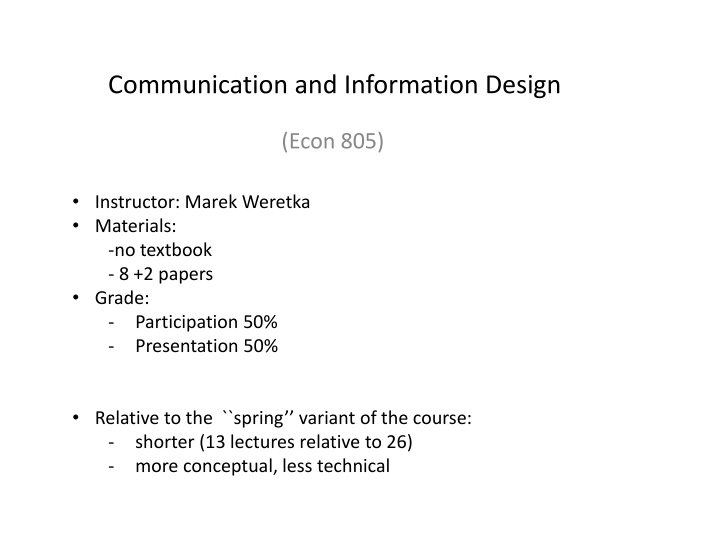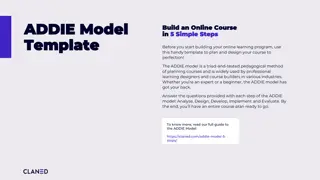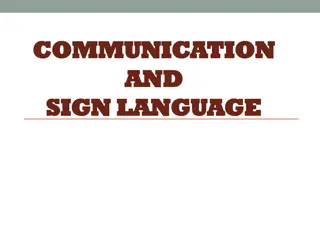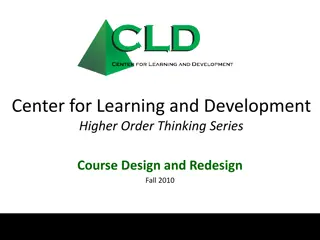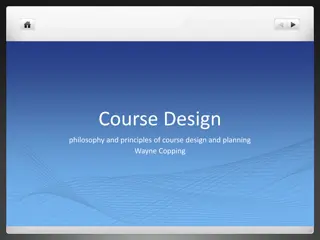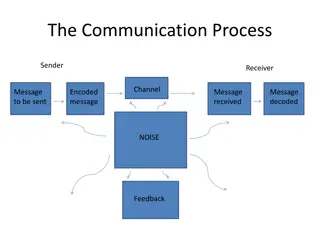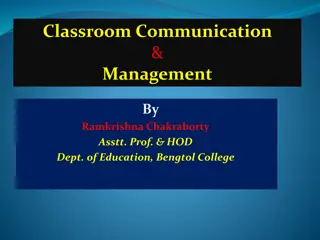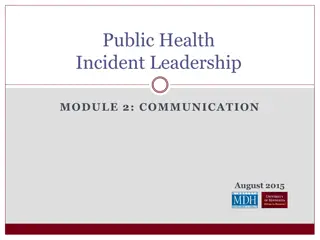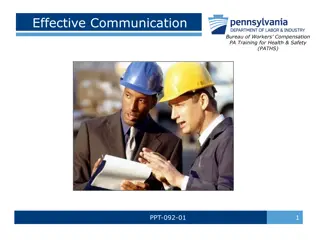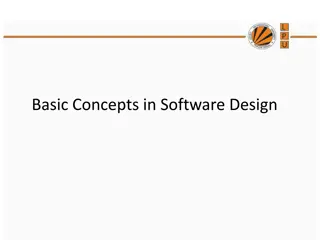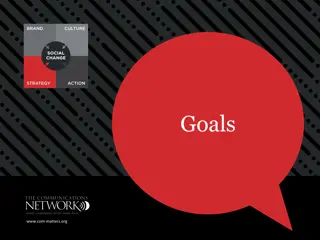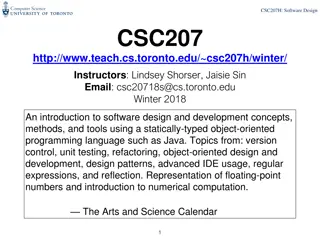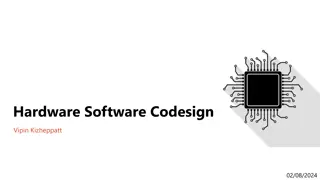Communication and Information Design Course Overview
This course, Econ.805, focuses on communication and information design principles with an emphasis on participation and presentations. The course covers essential topics such as importance of communication, strategies for effective communication, and applications in various fields. Students will explore questions related to communication, decision-making, and information transmission within the Sender-Receiver model. The course aims to enhance understanding of how communication can influence outcomes in diverse scenarios.
Download Presentation

Please find below an Image/Link to download the presentation.
The content on the website is provided AS IS for your information and personal use only. It may not be sold, licensed, or shared on other websites without obtaining consent from the author.If you encounter any issues during the download, it is possible that the publisher has removed the file from their server.
You are allowed to download the files provided on this website for personal or commercial use, subject to the condition that they are used lawfully. All files are the property of their respective owners.
The content on the website is provided AS IS for your information and personal use only. It may not be sold, licensed, or shared on other websites without obtaining consent from the author.
E N D
Presentation Transcript
Communication and Information Design (Econ 805) Instructor: Marek Weretka Materials: -no textbook - 8 +2 papers Grade: - Participation 50% - Presentation 50% Relative to the ``spring variant of the course: - shorter (13 lectures relative to 26) - more conceptual, less technical
Important surveys Giving and Receiving Advice Sobel, 2013 Information Design: A unified perspective Bergmann and Morris, 2017 Key players
Questions Important questions: 1) Why do we talk? 2) When one should conceal her private information? 3) When should one be skeptical about other s advice? 4) When communication ameliorate problems of asymmetric information? 5) Can consultations with many experts improve communication? 6) Which institutions foster effective communication? 7) Can a rational (Bayesian) agent be persuaded/manipulated? If yes how? 8) Should one reveal information publicly or privately? 9) Can a population of rational agents be persuaded? How? All these questions can be answered within a Sender-Receiver model
Sender-Receiver (S-R) Model Two (types of) agents: - Sender(s) S (expert, informed agent) - Receiver(s) R (decision maker, uninformed agent) Timing and actions: - S observes state , sends message - R observes message , choses action Preferences: Depending on a state and message set, (lack of) commitment power, number of R and S the model becomes a Cheap Talk or Consultation Game, Mediation, Arbitration, Disclosure, Bayesian Persuasion and Information Design These games offer alternative insights regarding strategic communication.
Recent explosion of applications to Industrial Organization Auction Theory Finance Political science Economics of Media Organizational Science Zoology Linguistics (Pragmatics)
Outline of the Course (8 papers) Information transmission without commitment: (10/26) Introduction, Sender Receiver Model (10/31) Basic Cheap Talk: Partition Equilibrium (Crawford and Sobel, ECMA 1982) (11/02) Normative Implications of Cheap Talk (Crawford and Sobel, ECMA 1982) (11/07) Multidimensional Cheap Talk (Chakraborty and Harbaugh AER 2010 JET 2006) (11/09) Many Senders (Battaglini, ECMA 2002) Information transmission with commitment: (11/14): Arbitration and Mediation (Goltsman, at. al. JET 2009) (11/16): Basic Persuasion Game (Kamienica and Gentzkow, AER 2011) (11/21): Basic Persuasion Game (Kamienica and Gentzkow, AER 2011) (11/28): Information Design (Bergmann and Morris, 2017) (11/30): Information Design (Bergmann and Morris, 2017) (12/05): Competition in Persuasion (Kamienica and Gentzkow, Restud 2016) Many important topics are left out (potential presentations)
Basic Cheap Talk Game Basic cheap talk (Crawford and Sobel, 1982, Green and Stocky, 2007) - Sender-Receiver, no commitment - State space - Action space - Message space - Preferences: Interpretation: Media outlet and a voter Solution concept: PBN equilibrium Equilibrium types: - Bubbling - (Fully) revealing - Influential
Basic Cheap Talk Game Technical insights: - Existence of PBN? Bubbling equilibrium always exists - Fully revealing equilibrium - Any PBN has a structure of a partition equilibrium - Indeterminacy (3 types) - Refinements: No beneficial neologisms, evolutionary, behavioral types Substantive insights: transmission of information requires - preferences of sender types in conflict - preferences of S and R aligned - no communication whenever S preferences independent of types (large bias in CS, monetary payment, probability of acceptance)
Many dimensions Multidimensional state space (Chakraborty and Harbaugh 2006, 2010) - Example 1: recommendation letters for Ph.D. students - Example 2: biased newspaper Two insights: - shared interests of S and R are more common than you think - Ex ante S welfare may decrease with informativeness ``Competition among many senders (Battaglini 2002) - Extreme action as a punishment (lack of robustness) - Full revelation is ``robust without punishment Key insight: competition fosters transmission of information
Commitment of Receiver: Institutions Objective: ex ante welfare of R (quadratic preferences =S) ``Broken phone paradox (Blume, Board and Kawamura 2007) Mediation: - Third party collects information from S and sends signal to R - Optimal mediation improves over one round of cheap talk - ``Broken phone implements optimal mediation rule - Long cheap talk Arbitration - Third party collects information, makes binding recommendation to R - Optimal arbitration rule delegation with cap - Very effective communication
S commitment: Persuasion and Information Design Sender ex ante commits to strategy Objective: ex ante welfare of S Interpretation: literal or metaphorical designer Bayesian persuasion: one receiver with no prior Key insights - S selectively obfuscates information (outcome manipulation) - Less power to manipulate if R initially more informed (precise prior) - Many R: Private vs public signals Technical insights: - Concavification of value function (S-R model) - Two stage procedure
Important topics that are left out Papers for potential presentations 1. Equilibrium Selection in Cheap Talk Games Farrell GEB 1993, Blume Kim and Sobel Geb 93, Chen, Kartik and Sobel ECMA 2008 2. Long cheap talk Aumann ECMA 2003 3. Partly Verifiable signals Milgrom 2008 Glazer and Rubinstein, ECMA 2004,TE 2006 3. Dynamic Information Transmission Ely, AER 2016 Ely Frankel and Kamenica 2015 4. Costly Information Che and Kartik, JPE 2009 5. Application to markets: Che, Dessein and Kartik AER 2013 Bergrman Brooks and Morris AER 2015, ECMA 2017 (+ 2 new papers) 6. Information transmission and voting Kendall et al. AER 2015 Kartik and Weelden (mimeo) 2017 7. Information transmission and media Gentzkow and Shaprio ECMA 2010
